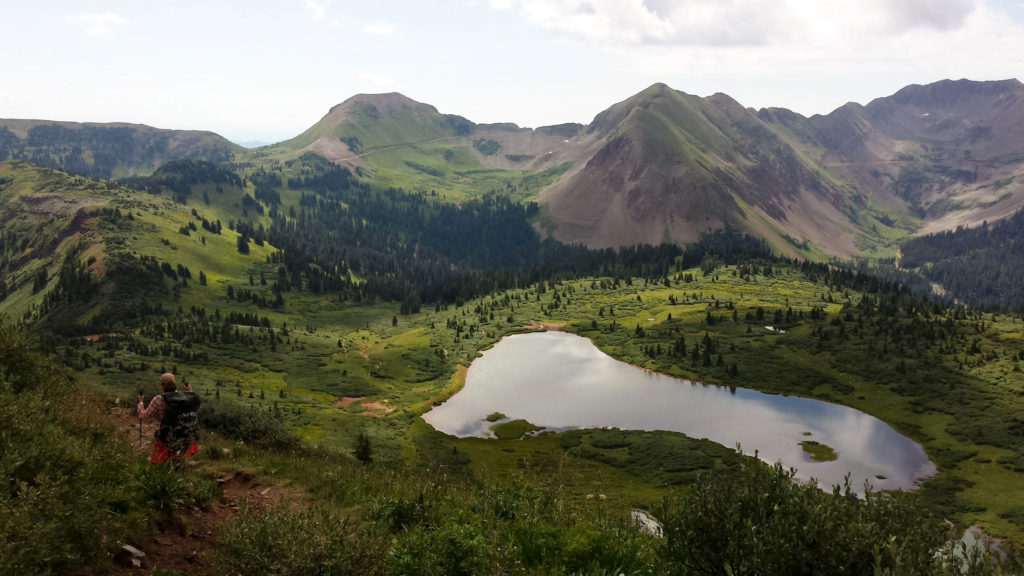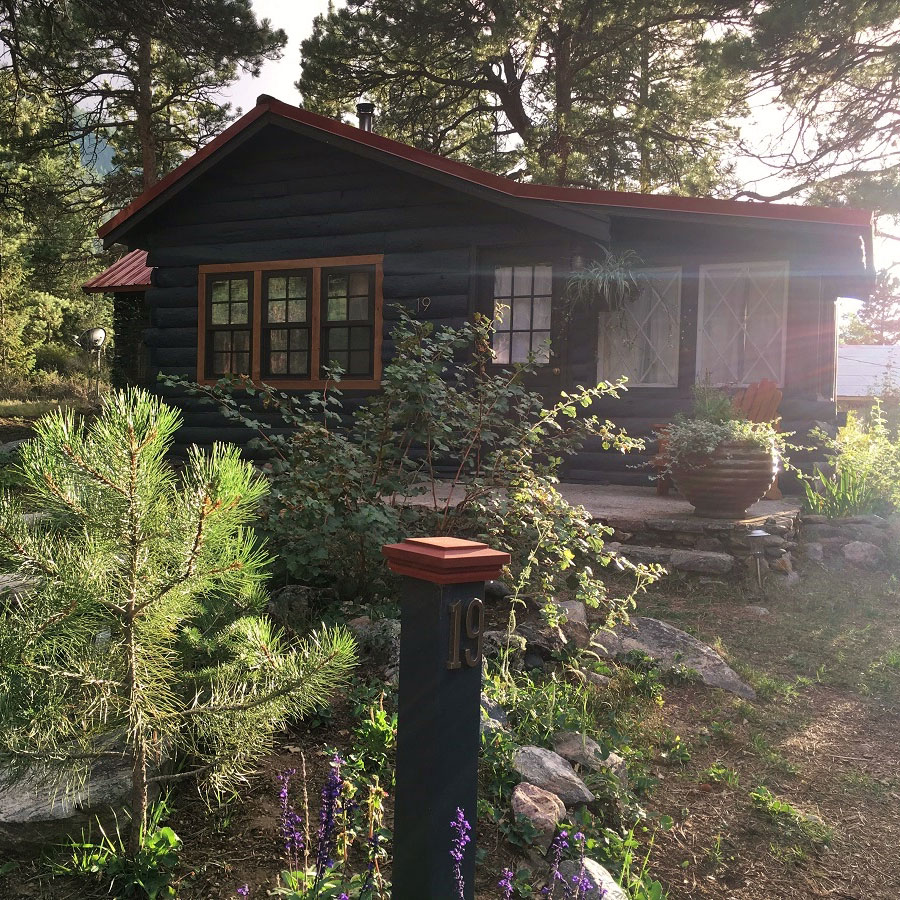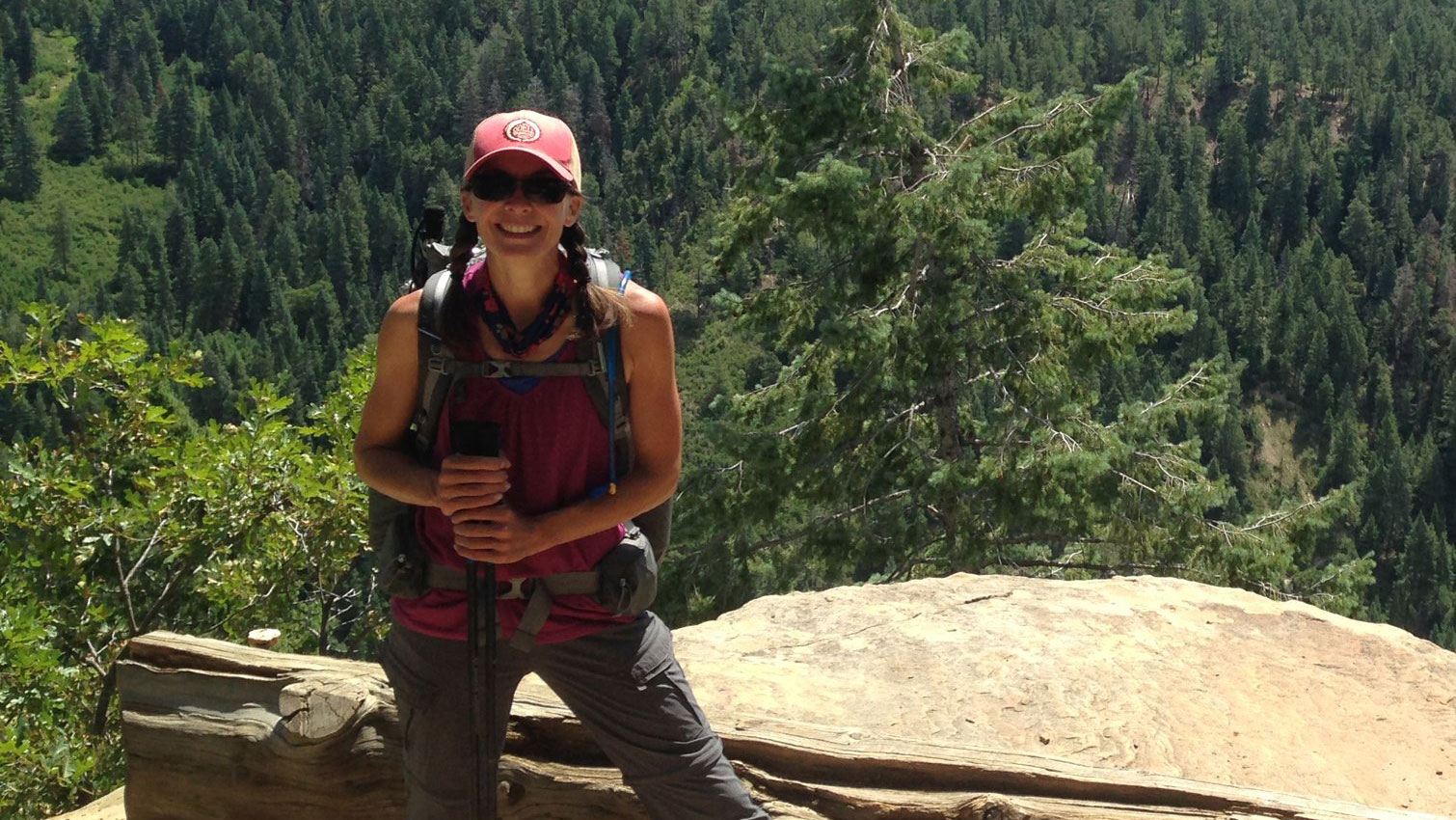Becky Jensen started out in the freelancing world as a way to get back into the workforce after being a stay-at-home mom for six years.
Over 12 years later, Jensen now lives in a cabin by a wild river in Northern Colorado. While Jensen is a self-proclaimed “copywriting workhorse,” she didn’t really start writing about the outdoors in her own voice until 2016 when she spent five weeks hiking the Colorado Trail.
Before that, she focused on freelance copywriting, content management, media relations and marketing strategy (she still does these, but now also writes in her own voice too).
In her own words, here’s what Becky has to say.
Year Started Freelancing Full-Time: 2008
Age When Started Freelancing Full-Time: 38
Preferred Pronouns: She/her

What’s your “about you” elevator pitch for what you do?
I’m a freelance writer and podcast contributor based in Colorado. When I’m not on assignment, I’m writing a memoir about running away from home into the mountains for five weeks when I was 45.
What did you do before freelancing?
In 1996, I worked in the corporate communications department at an oil and gas company in Denver. It was a sexist, good-ol’-boys work culture that tested my moral compass and nearly broke my spirit.
After three years, I finally quit and landed a job with an organization that respected people instead of using them up, healed the earth instead of plundering it. As the media relations manager for The Nature Conservancy of Colorado, my job was to share stories about the good work being done to protect entire ecosystems and restore them back to health. It was awesome. The only reason I left was to stay at home to raise my twin sons, Jake and Dane.
What made you decide to start freelancing?
I had been married for nine years, my boys had started school, and divorce was looming on the horizon. As a stay-at-home mom for six years, I was completely out of touch with current marketing tactics and my writing skills were beyond rusty, but I was desperate to earn a living, to live independently, as a single mom. I felt like a workforce outsider, so slow and dull-witted. The thought of a fast-paced office environment, of returning to a cubicle again, instantly made me nauseous. Freelancing eased me back into the workforce and helped to sharpen my skills at my own pace. It also gave me the flexibility to work from home when my kids were at school, or at night when they were sleeping, so I wouldn’t have to pay for childcare.
What was your education before starting freelancing?
I have a B.S. in business administration and marketing from Colorado State University.
What preparation did you do before going full-time freelance?
I squirreled away as much money as I possibly could. I secured a few bread-and-butter clients that would provide consistent work each month, and I talked to a CPA for tax advice. I asked other full-time freelancers for tips and lessons learned so I wouldn’t have to reinvent the wheel.
What was the most challenging thing for you when you first started?
There were so many challenges, I’m not sure which one to pick. The inconsistent income was probably the worst. I’m a planner by nature and I love a steady paycheck. The uncertainty of income, as a newly divorced mom of twins who had a mortgage and bills to pay, kept me up at night.
What helped you the most when starting out?
Creating trusting relationships with a few, key clients who gave me steady work. Living an extremely frugal lifestyle.
How did you get clients when you first started?
I decided to start out small and local to get my feet under me, to build my confidence and my portfolio. With pen and paper, I created a list of local companies and organizations that I respected and where I had a personal contact in-house. I reached out to the contact and asked if they needed any help with writing; I offered to tell their organization’s story.
My very first freelance gig was in 2007 for a local nonprofit that needed a brochure. I donated my writing services and a local marketing firm donated the design. During the project, I developed a great working relationship with the marketing firm, who then hired me for future copywriting work.
My background in marketing, corporate communications and consumer behavior served me well, and soon I became the go-to freelancer in their stable of copywriters. As my portfolio grew, my credibility grew, and I attracted new corporate, academic and nonprofit clients of my own. I no longer needed the marketing firm to feed me work, so we parted ways. I left on great terms and we all remain close friends to this day.
How did you get into the outdoors niche?
In 2016, I thru-hiked the 486-mile Colorado Trail. The five-week solo backpacking trip reminded me how much I love the outdoors and need it to be more central in my life. The hike inspired me to write about my experiences in nature, in my own voice, as personal essays and in memoir. One of the first personal essays I wrote was recorded as an episode for Out There, a podcast that explores big questions through intimate stories in the outdoors. I have since become a regular contributor to the podcast. The thru-hike also led me to buy a cabin by a wild river in a Northern Colorado canyon where I now live and write full-time.

Do you ever go into other topics?
Heck yes. I remain loyal to a small group of clients who supported me in the early days as a freelancer. I still write blogs, magazine feature articles, profile pieces, website copy, newsletter stories, press releases, and more for them, about topics specific to their industries, including higher education, lifestyle, wellness, and home improvement.
When did you make your website portfolio?
Not until early 2017. I had a lot of demand for my copywriting and ghostwriting work already, so for years I purposely avoided making a website because I didn’t want to create more demand when I was struggling to keep up with my current workload. I didn’t want to tell more potential clients no. When I decided to position myself as an outdoors writer in early 2017, I created my website with a portfolio that prioritized my newly published work about the outdoors.
How did you make it?
I created it myself using a Squarespace template.
How do you work in vacation or sick days?
I take them as I need them. The beauty of being your own boss!
How do you handle your accounting?
I invoice monthly, keep track of business expenses, pay estimated taxes quarterly. I turn everything over to my CPA who creates my Schedule C and files my taxes for me.
How do you manage retirement funding?
Poorly. I have a modest IRA that I typically ignore. I hope to contribute monthly in 2021.
How do you decide your rates?
I research hourly and per-word rates for our industry. I talk to peers. My current rate is $100/hour, or $1/word.
How do you decide when you bump up your rates?
Same as above. I also keep tabs on how long it’s been since my last rate increase and try to keep up with inflation. If I have too much demand and I’m turning away a lot of new clients, then I know it’s probably time to bump up my rates.
How do you negotiate rates with clients?
I create an estimate with a clear scope of services and provide: a.) a flat rate for the job, b.) an hourly rate, with the estimated number of hours to complete the job, or, c.) a per-word rate for the job. I stick to my estimate.
If the client is on a budget, we talk about adjusting the scope of services to better fit their budget. If an editor offers a per-word rate that is below my usual fee, I counter with a more appropriate rate given my experience and industry standards. If they can’t pay me what I feel I should be paid (what my time is worth), then I wish them well and release the assignment.
Having said that, if I really, REALLY want to get into a particular publication, then I will accept a lower fee because of the value the clip will add to my portfolio.
How much did you make in your first full year freelancing full-time?
I grossed $30,774.
Approximately how much do you make annually now?
I grossed more than $42,000 in 2020. Over the last ten years, my lowest gross annual income was $22,480 and my highest annual income was $70,720. The year I made more than $70,000 was a miserable, workaholic year and not sustainable. The year I made $22,480 was the year my mom was diagnosed with Alzheimer’s disease, and it rocked my world.
How did you start making more?
I created a monthly retainer with my biggest corporate client. I increased my hourly rate. I tried to choose publications that paid well. I focused on bigger projects and fewer clients.
How do you invoice?
I’m so old school it’s embarrassing.
I created an invoice template using an Excel spreadsheet. I fill it in at the end of the project, save it as a PDF, and email the PDF to clients. I keep all the invoices in a binder, reconcile my accounts payable and receivable each month, and hand it all over to my CPA at the end of the year.
I do not use QuickBooks. I have a kickass CPA who has no problem with my simple system.
Have you ever had to dump a client?
Yes, and I’ve also refused to take on a project because of the client. I have a strict “no assholes” policy.
I was once contacted by an older guy who asked me to edit a mansplaining book he had written about feminism, that showcased “artwork” he had painted that objectified women. I declined and explained why. I’m pretty good at sniffing out high-maintenance clients who, I suspect, will devour too much of my time and energy. I also worked with a friend on her website copy, and had to carefully extract myself from that job to save our friendship.
How do you find the right clients?
Referrals carry a lot of weight with me. I always research a new client online. I want to work for a company I respect, and with people who will treat me with respect, so I like to read their customer testimonials and online reviews.
When it comes to print and online media, my preference is to pitch the ones I like to read myself, the ones I know and respect, the publications I connect with.
What makes a good client to you?
They:
- Respect my time.
- Value my ideas and expertise.
- Pay me fairly.
- Revise using constructive feedback.
- Set clear expectations.
- Are great communicators.
- Have a sense of humor.
How do you handle clients asking for more work without paying you more? (i.e. extra revisions, extra research, etc.)
I’ve been burned by this before, so I always create a clear scope of services (includes the number of revisions included in the quoted price), and ask them to sign the estimate before any writing work begins.
If they ask me to work beyond the original scope, we have to confirm a scope adjustment in writing before I proceed. I include specific language in the estimate so they know any work requested beyond the scope will be billed at my hourly rate (in addition to the approved estimate amount).
But between you and me, I sometimes throw in a little extra work for free, especially for my favorite clients.
How do you decide you’re at capacity or not going to take on any new work?
It has taken me years to figure this out! I still overbook myself sometimes and spread myself way too thin, but it’s rarer these days. I think this comes from years of underestimating projects and learning from my painful mistakes. I have a good idea of how much time it will take me to complete certain assignments. So I have a good sense of how many assignments I can take on, and how many clients I can work with, at a given time.
How do you communicate your value to clients?
I have a business and marketing background, and pay attention to my results, especially how my writing affects a client’s bottom line. I encourage my clients to build measurements into the pieces I write for them so they can see my value without me having to tell them.
When one client was retooling their “how did you hear about us?” online questionnaire, I asked them to include categories that captured specific projects I had worked on for them (website, blogs, newsletter, etc.). This produced hard numbers that showed valuable customer leads directly tied to pieces of my writing. And when a client’s customer contacts them with a positive comment about my writing, that also communicates my value to my client without me having to say a word. It’s powerful.
What signals a red flag to you about a client you’re considering?
When they ask me to write content for a full website and think it will only take a few weeks. Danger, danger! Or when they won’t sign an estimate (my legal contract). Or poor communication, poor response time.
What do you think you’re best at as a freelancer?
Figuring out the story angle.
Do you have any tips for how you do that?
I ask myself “What about this story grabs me? What would grab someone else? Why would they care?” The angle has to be human and relatable, yet offer a new take on something that’s probably been written about a million times. I’m not satisfied until I unbury the hidden nugget that’s a fresh take on the subject matter. Don’t be afraid of research and interviews that go in unplanned directions or down weird rabbit holes. That’s where you usually find the oddball little nuggets that totally make your story.
What do you like the most about freelancing?
I can listen to the river, and watch the chipmunks play on the woodpile, as I work from my cabin. The flexibility of my schedule.
How do you manage to stay inspired or cultivate enough creativity to continually think of stories?
I split my time working between two things: 1.) telling my clients’ stories, and, 2.) telling my own personal stories about the outdoors.
There is always plenty of material and interesting story angles, you just have to ask deeper questions, be a good listener and take great notes.
Have you ever gotten burnt out?
YES. Twice. Once in 2010, right after I lost my dad. I had been full-time freelancing for three years, I was exhausted and grieving, and felt like freelancing was way too much pressure to bear at the time. Life was too unstable, and I wanted stability, so I took a proposal-writing job for a few years to earn that steady paycheck. But writing technical proposals for the Department of Defense never sat right with me, so I quit and went back to freelancing in 2013.
By 2016, I was burned out again. This time, I was deeply depressed and had lost my creative spark. It took me longer and longer to write a single sentence. I can look back now and see a perfect storm during that time, so many stresses and challenges converging on my life at once. I felt hollow inside, didn’t care about anything I was writing, and felt trapped on a treadmill of crappy copywriting jobs. That’s when I decided to hike the Colorado Trail for five weeks, and I’m not being melodramatic when I say that hike saved my life. It made me an outdoor writer.
How do you decide when to strengthen your current skills or learn new ones?
I am always looking for ways to strengthen my current skills AND learn new ones. This is a daily practice and lifelong pursuit. There is always something to learn.
If you could give one piece of advice to a newer woman freelancer getting into the outdoor industry, what would it be?
Every time a female freelancer gets a byline in the outdoor industry, it helps us all. So don’t view other women as the competition, as the enemy, fighting over limited space on the page. Instead, see them as part of the greater sisterhood, a support network, that wants you to succeed – that wants your story heard. Ask other women for help when you need it. Give help to others when asked. We’re in this together.
If you want to learn more about Becky Jensen and read some of her award-winning writing or listen to some of the podcasts she’s created, check out her website.
A few of her stories:

